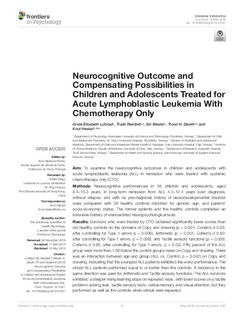| dc.description.abstract | Aim: To examine the neurocognitive outcomes in children and adolescents with acute lymphoblastic leukemia (ALL) in remission who were treated with systemic chemotherapy only (CTO). Methods: Neurocognitive performances in 36 children and adolescents, aged 8.4–15.3 years, in long-term remission from ALL 4.3–12.4 years post diagnosis, without relapse, and with no pre-diagnosis history of neurodevelopmental disorder were compared with 36 healthy controls matched for gender, age, and parents’ socio-economic status. The former patients and the healthy controls completed an extensive battery of standardized neuropsychological tests. Results: Survivors who were treated by CTO obtained significantly lower scores than did healthy controls on the domains of Copy and drawing (p = 0.001; Cohen’s d 0.85; after controlling for Type 1 errors q = 0.006), Arithmetic (p = 0.001; Cohen’s d 0.80; after controlling for Type 1 errors, q = 0.006), and Tactile sensory functions (p = 0.008; Cohen’s d 0.65; after controlling for Type 1 errors, q = 0.03). Fifty percent of the ALL group were more than 1 SD below the control groups mean on Copy and drawing. There was an interaction between age and group (ALL vs. Control, p = 0.042) on Copy and drawing, indicating that the youngest ALL patients exhibited the worst performance. The oldest ALL patients performed equal to or better than the controls. A tendency in the same direction was seen for Arithmetic and Tactile sensory functions. The ALL survivors exhibited a steeper rising learning slope on repeated tests, with lower scores on a tactile problem-solving task, tactile sensory tests, verbal memory, and visual attention, but they performed as well as the controls when stimuli were repeated. Conclusion: The results indicate that neurocognitive long-term sequelae in ALL survivors are limited to specific domains – particularly complex drawing, arithmetic, and tactile processing, and novelty processing. Cognitive deficits are shown among the youngest ALL patients. Intervention programs and school programs should account for difficulties with processing new information and taking advantage of repetitions as a strength, which may prevent survivors from falling behind their peers. | |
